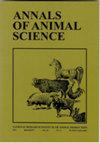Multiple exposure to thunderstorm sound in Nile tilapia (Oreochromis niloticus): physiological response and stress recovery
IF 2.2
4区 农林科学
Q2 AGRICULTURE, DAIRY & ANIMAL SCIENCE
引用次数: 0
Abstract
Abstract The present study investigated the impacts of multiple thunderstorm-sound exposures on growth and respiratory parameters in Nile tilapia (Oreochromis niloticus) in order to evaluate the acoustic stress response. Thunderstorm-sound exposure for 3 hours triggered respiration speed with an alarm reflex and rapid elevation of opercula beat rate (OBR) and pectoral wing rate (PWR), which increased two-fold over the control with no sound treatment, and peaked (OBR, 71.33±5.86 beat/min; PWR, 75.00±3.61 beat/min) in 10 hours after initiation of sound. Thereafter, respiration rates declined over the following days and returned to near-initial levels (45.33±4.04 beat/min OBR and 43.00±1.00 beat/min PWR) by day 3, an indication that fish recovered from thunderstorm-sound stress after 3 days of exposure. However, the same reaction course was observed each time of multiple sound exposures, repeated 20 times in a row with 4-day intervals, underlining that fish could not attune to repeated thunderstorm sound. Reduced voluntary feed intake as a result of anxiety and appetite loss was recorded in fish exposed to multiple thunderstorm sound, resulting in 50% less growth compared to those without sound treatment by the end of the 80-day experimentation. Therefore, it is advisable to monitor fish behavior during the 3-day stress period after a thunderstorm event in order to prevent waste from excess feeding, that in turn may contribute environment-friendly aquaculture for the future and sustainability of the oceans.尼罗罗非鱼(Oreochromis niloticus)多次暴露于雷暴声:生理反应和应激恢复
摘要本研究研究了多次雷暴声暴露对尼罗罗非鱼(Oreochromis niloticus)生长和呼吸参数的影响。暴露于雷暴声3 h后,呼吸速度出现报警反射,胸盖搏动率(OBR)和胸翼搏动率(PWR)快速升高,比无声音处理的对照组增加2倍,最高为(OBR) 71.33±5.86次/min;压水堆,75.00±3.61次/分),在声音开始后10小时。此后,呼吸速率在接下来的几天里下降,并在第3天恢复到接近初始水平(45.33±4.04拍/分钟OBR和43.00±1.00拍/分钟PWR),这表明鱼在暴露3天后从雷暴声应激中恢复。然而,多次声音暴露每次观察到相同的反应过程,连续重复20次,间隔4天,强调鱼不能适应重复的雷暴声音。在80天的实验结束时,暴露于多次雷暴声的鱼由于焦虑和食欲下降而减少了自愿采食量,与没有声音处理的鱼相比,导致生长减少50%。因此,建议在雷暴事件后的3天应激期监测鱼类行为,以防止过度摄食造成的浪费,从而为海洋的未来和可持续发展做出环境友好型水产养殖贡献。
本文章由计算机程序翻译,如有差异,请以英文原文为准。
求助全文
约1分钟内获得全文
求助全文
来源期刊

Annals of Animal Science
农林科学-奶制品与动物科学
CiteScore
4.00
自引率
5.30%
发文量
138
审稿时长
6-12 weeks
期刊介绍:
Annals of Animal Science accepts original papers and reviews from the different topics of animal science: genetic and farm animal breeding, the biology, physiology and reproduction of animals, animal nutrition and feedstuffs, environment, hygiene and animal production technology, quality of animal origin products, economics and the organization of animal production.
 求助内容:
求助内容: 应助结果提醒方式:
应助结果提醒方式:


